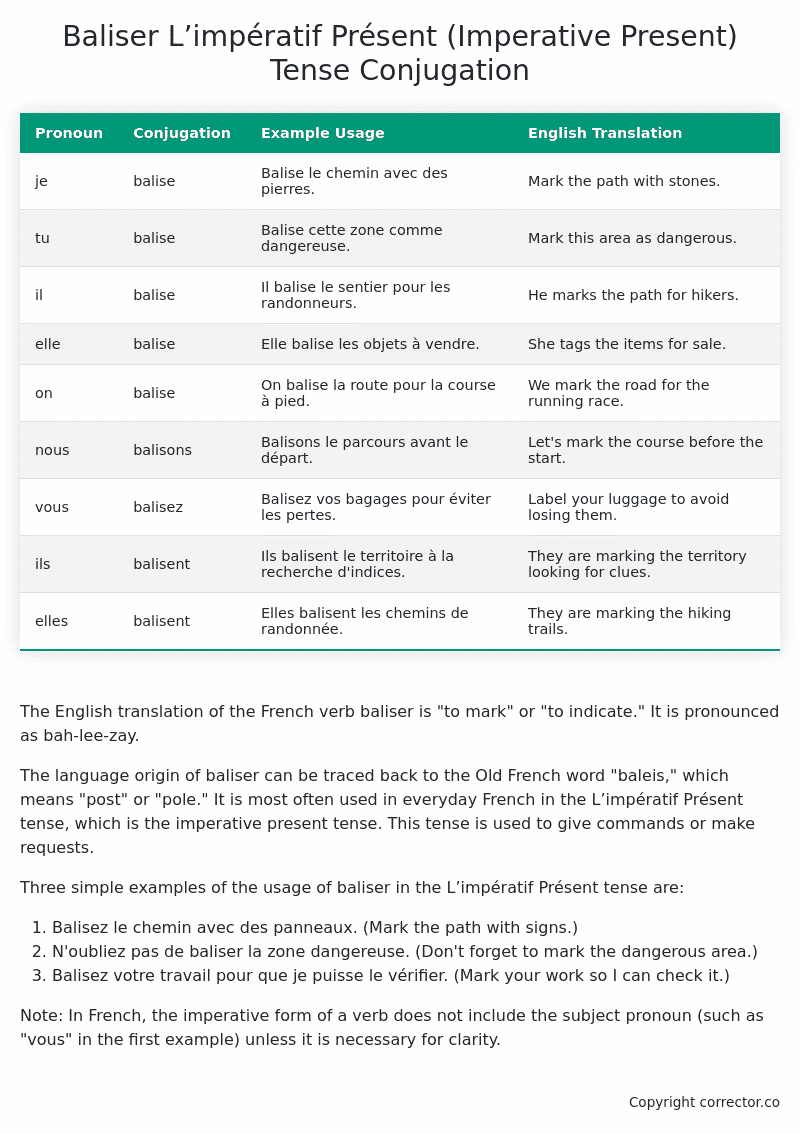L’impératif Présent (Imperative Present) Tense Conjugation of the French Verb baliser
Introduction to the verb baliser
The English translation of the French verb baliser is “to mark” or “to indicate.” It is pronounced as bah-lee-zay.
The language origin of baliser can be traced back to the Old French word “baleis,” which means “post” or “pole.” It is most often used in everyday French in the L’impératif Présent tense, which is the imperative present tense. This tense is used to give commands or make requests.
Three simple examples of the usage of baliser in the L’impératif Présent tense are:
- Balisez le chemin avec des panneaux. (Mark the path with signs.)
- N’oubliez pas de baliser la zone dangereuse. (Don’t forget to mark the dangerous area.)
- Balisez votre travail pour que je puisse le vérifier. (Mark your work so I can check it.)
Note: In French, the imperative form of a verb does not include the subject pronoun (such as “vous” in the first example) unless it is necessary for clarity.
Table of the L’impératif Présent (Imperative Present) Tense Conjugation of baliser
| Pronoun | Conjugation | Example Usage | English Translation |
|---|---|---|---|
| je | balise | Balise le chemin avec des pierres. | Mark the path with stones. |
| tu | balise | Balise cette zone comme dangereuse. | Mark this area as dangerous. |
| il | balise | Il balise le sentier pour les randonneurs. | He marks the path for hikers. |
| elle | balise | Elle balise les objets à vendre. | She tags the items for sale. |
| on | balise | On balise la route pour la course à pied. | We mark the road for the running race. |
| nous | balisons | Balisons le parcours avant le départ. | Let’s mark the course before the start. |
| vous | balisez | Balisez vos bagages pour éviter les pertes. | Label your luggage to avoid losing them. |
| ils | balisent | Ils balisent le territoire à la recherche d’indices. | They are marking the territory looking for clues. |
| elles | balisent | Elles balisent les chemins de randonnée. | They are marking the hiking trails. |
Other Conjugations for Baliser.
Le Present (Present Tense) Conjugation of the French Verb baliser
Imparfait (Imperfect) Tense Conjugation of the French Verb baliser
Passé Simple (Simple Past) Tense Conjugation of the French Verb baliser
Passé Composé (Present Perfect) Tense Conjugation of the French Verb baliser
Futur Simple (Simple Future) Tense Conjugation of the French Verb baliser
Futur Proche (Near Future) Tense Conjugation of the French Verb baliser
Plus-que-parfait (Pluperfect) Tense Conjugation of the French Verb baliser
Passé Antérieur (Past Anterior) Tense Conjugation of the French Verb baliser
Futur Antérieur (Future Anterior) Tense Conjugation of the French Verb baliser
Subjonctif Présent (Subjunctive Present) Tense Conjugation of the French Verb baliser
Subjonctif Passé (Subjunctive Past) Tense Conjugation of the French Verb baliser
Subjonctif Imparfait (Subjunctive Imperfect) Tense Conjugation of the French Verb baliser
Subjonctif Plus-que-parfait (Subjunctive Pluperfect) Tense Conjugation of the French Verb baliser
Conditionnel Présent (Conditional Present) Tense Conjugation of the French Verb baliser
Conditionnel Passé (Conditional Past) Tense Conjugation of the French Verb baliser
L’impératif Présent (Imperative Present) Tense Conjugation of the French Verb baliser (this article)
L’infinitif Présent (Infinitive Present) Tense Conjugation of the French Verb baliser
Struggling with French verbs or the language in general? Why not use our free French Grammar Checker – no registration required!
Get a FREE Download Study Sheet of this Conjugation 🔥
Simply right click the image below, click “save image” and get your free reference for the baliser L’impératif Présent tense conjugation!

Baliser – About the French L’impératif Présent (Imperative Present) Tense
Usage
Giving commands
Making requests
Offering advice
Expressing desires
Conjugation Formation
Interactions with other tenses
Want More?
I hope you enjoyed this article on the verb baliser. Still in a learning mood? Check out another TOTALLY random French verb conjugation!


